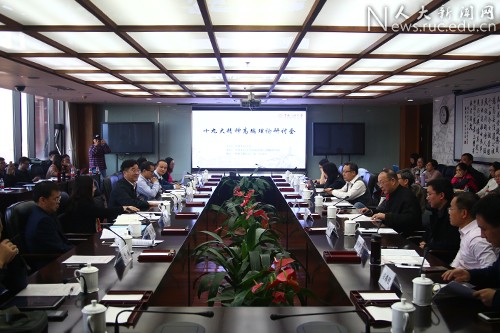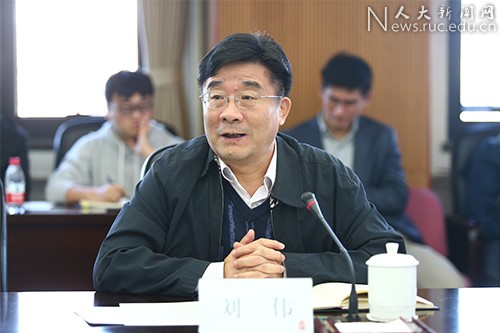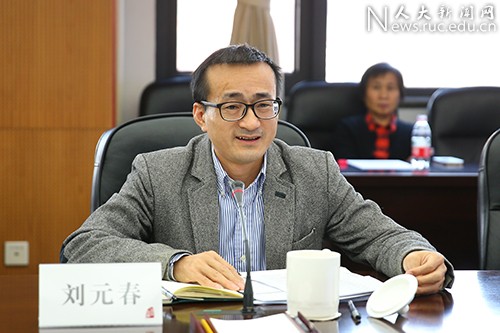 Research Update
Research Update
15
NovemberNovember 1st and 2nd, "The Spirit of 19th CPC National Congress" Theoretical Seminar were held by NADS, RUC. In attendance were 30 scholars and experts from School of Philosophy, School of Economics, School of Marxism, School of International Studies, School of Public Administration and Policy and NADS, RUC. This seminar aimed at interpreting the context and thoughts of the National Congress and deepening the study of theoretical basis and system.

The seminar was moderated by Liu Yuanchun, Vice President of RUC, Executive Dean of NADS. He pointed out that as one of the most influential institutions in the field of humanities and social sciences research, RUC had organized experts from various disciplines to work together on the study of the new ideas, basic strategies and strategy system of the National Congress. Recently, they had made series of achievements and attracted the attention from society.
Liu Wei, president of RUC, Dean of NADS, demonstrated that RUC will play a supportive role on the analysis of the complicated theoretical framework of the spirit of the CPC’s 19th National Congress and the spirit of socialism with Chinese characteristics in President Xi’s new era on the basis of RUC's theoretical resources. At the same time, scholars of RUC share the motivation of serving the nation, government and the party through interpreting the policies of the party. It is worth noticing that this study will be a long-term task rather than an urgent one. With the expectations from the government and people, scholars are expected to bring their potentiality into full play. Meanwhile, as one of China’s first batch of 25 pilot units for national high-end think tank construction, NADS should be more productive in academia and scholars should also try to apply their new thoughts in education.

Topics of the seminar range from the historical trend of the new era, the building of the party, the shift of China's principal social contradiction, new features of the diplomatic area, to rule of law, constitutional review, etc.
Prof. Yang Deshan from School of Marxism pointed out that the leadership of the party and its construction counts one-sixth of the Congress report's context, which could be analyzed from three aspects. First, from the historical aspect, China has entered a new era of the party's construction since the 18th National Congress. This keeps pace with the nation’s temporary goal. Second, from the prospect of politics, Chinese party was set based on the will of the whole country and people rather than any religion, which means China’s electoral system is essentially different from that of the western countries. In this sense, academia should analyze domestic issues on the basis of CCP itself. Last, in the 19th CPC National Congress report, the ‘common goal’ has been embraced by the system. That represents the four-pronged comprehensive strategy and highlights the importance of fostering stronger confidence in the path, theory, system, and culture of socialism with Chinese characteristics.
In terms of ‘Xi Jinping Thought on Socialism with Chinese Characteristics for a New Era’, Yang Guangbin, Chang Jiang Programme scholar, Dean of School of International Studies, said that the vision of time is a specific way of thought and work in Marxism. He mentioned that global politics in the new era has a profound meaning, while the West mostly focus on the analysis of the influence of China’s project and system. Prof. Qin Xuan at School of Marxism held that the shift of the principal contradiction has led China to a stage of the new era rather than the opposite. Prof. Yang Ruilong at School of Economics, another Chang Jiang Program scholar, added that the reform of the new era has also entered a new stage, which has responded to some fundamental theory questions and may lead to changes from various aspects.
When it comes to diplomacy, Prof. Jin Canrong at School of International Studies pointed that China has begun to engage global affairs more actively, and tried to design a new universal philosophy. In order to realize the goals brought out by the 19th Congress, Chinese diplomacy should come up with more strategies. Prof. Pu Ping at School of International Studies stressed that the concept of building a community with a shared future for mankind surpass the past diplomatic theories. Prof. Song Wei mentioned that the overall national security outlook is consistent with basic principles of the party’s governance. Li Wei, vice professor at School of International Studies confirmed that the arrangement of the 19th Congress will help to build a much stronger diplomatic system.
As the report has carried out many new comments and requirements in relates to advancing law-based governance, Lin Jia, secretary of the Party committee at Law School, held that the report of the 19th Congress regards the building of law-based country, government and society as one of the most important indicators in advancing the modernization of socialist country. This has strengthened the strategic goal of law-based governance and encouraged the building of a moderately prosperous society in all respects. Mr. Lin said that the new era offered a top design for law-based governance and presented the path of socialist rule of law with Chinese characteristics. Prof. Zhang Xiang, Vice Dean of Law School, stressed that the report brought out the concept of constitutional review for the first time, which exists in the system of so-called modern countries. In order to settle the constitutional review down to the national system, we need to consider the reality of China as well as the existing people's congress system.
As for the prospect of socialist ecological civilization, according to Prof. Zhang Yunfei at School of Marxism, the 19th Congress report determines to turn the prospect into reality and, at the same time, embraces it into the system of the thought on Socialism with Chinese Characteristics for a New Era. He explained that Xi Jinping’s rhetoric system of ecological civilization includes three parts, namely core category, specific proposition, and goals.
In terms of the people-oriental strategy, Prof. Tao Wenzhao at School of Marxism emphasized that people, rather than the object, be the basis of the strategy. He also pointed out that the concept of people is changing and complicated, which should be analyzed carefully. It should also be noticed that people are the aim but not the tool to achieve any other goal. Prof. Wang Hufeng at School of Public Administration and Policy stressed the importance of the Healthy China strategy connecting to people’s livelihood.
Qi Fanhua and Liu Peng, professors at School of Public Administration and Policy, held that the 19th National Congress signified the modernization of the country's governance system. Prof. Qi added that in terms of administrative system reform, the power of local governments under the level of the province should be strengthened. These governments' Party institutes and administrative institutes need to work together and be standardized. Prof. Liu, meanwhile, said that the transformation from the Party’s leadership to the aims and measures of the modernization of the country’s governance is a task given by the new era as well as the history.
When it comes to the shift of the principal contradiction of China’s society, Prof. Ma Junfeng at School of Marxism pointed that the ‘unbalanced and inadequate development’ mostly referred to the economic problem, while on the other hand, it also represented the requirement in political, moral and social spheres. Prof. Nie Huihua, Vice Dean of NADS, held that the shift of the society's principal contradiction needed to be analyzed from three aspects, namely the causes, presence, and solutions.
